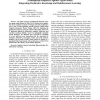109 search results - page 4 / 22 » The Biological Basis of the Immune System as a Model for Int... |
FLAIRS
2004
13 years 9 months ago
2004
Aperiodic dynamics are known to be essential in the formation of perceptual mechanisms and representations in biological organisms. Advances in neuroscience and computational neur...
AI
2008
Springer
13 years 7 months ago
2008
Springer
We propose a novel approach to self-regenerating continuously-operating systems. Such systems provide best-case solutions in security surveillance or decision making centers. We i...
IAT
2010
IEEE
13 years 5 months ago
2010
IEEE
Abstract--The paper proposes a biologically-inspired cognitive agent model, known as FALCON-X, based on an integration of the Adaptive Control of Thought (ACT-R) architecture and a...
AE
2001
Springer
14 years 1 days ago
2001
Springer
This is a time of increasing interdisciplinary research. Computer science is learning more from biology every day, enabling a plethora of new software techniques to flourish. And b...
GECCO
2005
Springer
14 years 1 months ago
2005
Springer
Researchers of HIV-1 are today, still unable to determine exactly the biological mechanisms that cause AIDS. Various mechanisms have been hypothesized and their existences have be...

